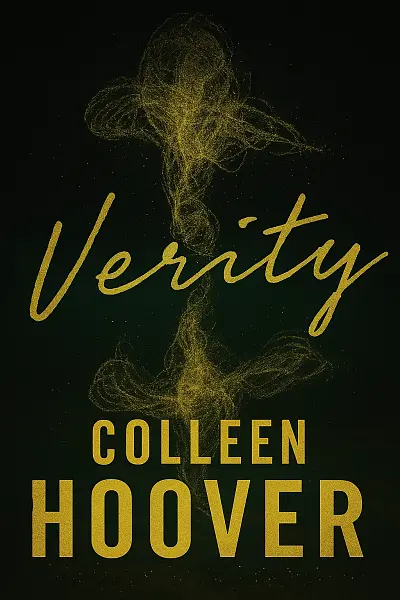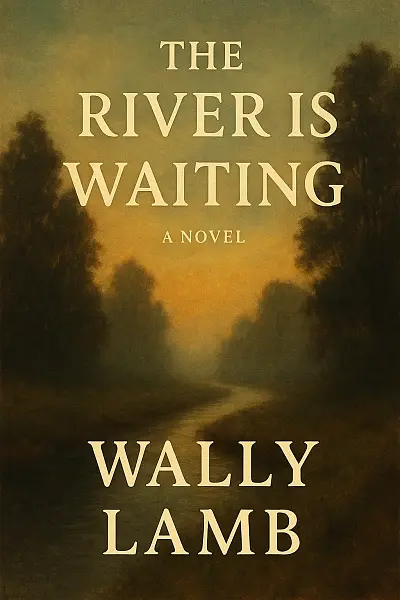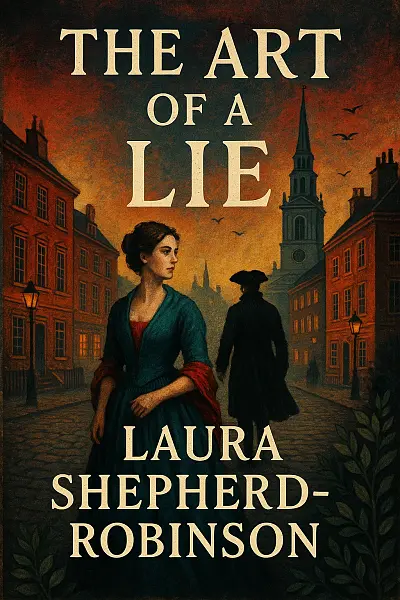
Verity
by: Colleen Hoover
Lowen Ashleigh, a struggling writer, walks into the imposing Crawford home, desperate for a new start after accepting an incredible offer: to finish the beloved book series of famous, now incapacitated author Verity Crawford.
Everything changes when Lowen stumbles across a chilling, unfinished autobiography among Verity’s papers—a manuscript packed with shocking confessions about the family’s darkest secrets.
Now, haunted by what she’s read and developing feelings for Jeremy, Verity's husband, Lowen is pulled between telling the truth and protecting herself.
Colleen Hoover dials up the tension with a twisty, suspenseful vibe, blurring the lines between love, fear, and obsession.
""The most dangerous truths are the ones we write and bury, hoping no one ever reads them—not even ourselves.""
Let's Break This Down
The Author's Voice
Atmosphere
Gothic undertones with a modern twist — The book oozes unease, blending claustrophobic tension with a chilling sense of voyeurism. Every scene feels charged, thick with anxiety and unpredictable danger, keeping you perpetually on edge. There's this simmering dread building beneath the surface, making even daylight moments feel haunted and suffocating.
Prose Style
Sharp, direct, and intimate — Hoover’s writing cuts straight to the point, skipping heavy ornamentation for a raw, confessional tone. The language is punchy, accessible, and incredibly current—think of inner monologue that’s painfully honest, at times almost abrasive. Descriptions are vivid but rarely linger; every detail feels purposeful and loaded with emotional residue.
Pacing
Taut and relentless — This book doesn’t let you catch your breath. Chapters snap off with a controlled urgency that makes it almost impossible to stop reading. Revelations drop steadily, with jaw-dropping twists and tense cliffhangers forcing you ever forward. It’s lean, propulsive storytelling—no wasted scenes, no filler.
Dialogue
Edgy and revealing — Character exchanges crackle with subtext, often exposing hidden wounds or masked intentions. The banter alternates between starkly realistic and unsettlingly ambiguous, constantly hinting that someone’s holding secrets. Expect conversations that feel both dangerously intimate and loaded with threat.
Character Focus
Deeply psychological, borderline obsessive — The narrative zeroes in on characters’ messy motivations, unreliable perspectives, and tangled emotions. There’s a sense of obsession—both in the storytelling and the characters themselves—creating a dizzying, up-close exploration of trauma and desire.
Overall Vibe
Darkly addictive and unnervingly immersive — Reading Verity feels like watching a storm roll in: you’re riveted, uneasy, and secretly loving every minute of the chaos. If you crave twisty, high-stakes writing where every word pulses with tension, this is a wild ride you’ll absolutely inhale.
Key Moments
- Jaw-dropping manuscript revelations that blur truth and fiction
- Lowen’s late-night discovery in Verity’s office: pure goosebumps
- Romantic tension sizzling between Lowen and Jeremy—toxic yet addictive
- Chilling inner monologue chapters from “Verity,” pushing boundaries of reliability
- Motherhood twisted into something dark, obsessive, unforgettable
- Final-page shocker: you’ll be questioning everything you just read
- Hoover’s trademark emotional gut punches—raw, messy, and deliciously unsettling
Plot Summary
Verity tells the dark and twisty tale of Lowen Ashleigh, a struggling writer who is offered the chance to complete a bestselling book series after the original author, Verity Crawford, is left unable to write due to a mysterious accident. As Lowen moves into the Crawford home to research Verity's notes, she stumbles upon an unpublished autobiography that reveals chilling confessions, including Verity’s possible role in the deaths of her twin daughters. As Lowen grows closer to Verity’s husband, Jeremy, suspense builds—culminating in Verity's dramatic death, which Jeremy helps orchestrate after reading the confession. The story ends with a shocking letter from Verity suggesting the manuscript was fictional and intended for her editor, leaving readers questioning what was real and what was manipulation.
Character Analysis
- Lowen Ashleigh begins timid and insecure but becomes more assertive as she uncovers disturbing secrets, motivated by both her attraction to Jeremy and her fear of Verity.
- Verity Crawford is shrouded in mystery, portrayed alternately as a monstrous mother or misunderstood victim, with her true nature cleverly obscured until the ambiguous conclusion.
- Jeremy Crawford is depicted as a grieving, morally complex husband whose devotion to his family leads him down a dark path, ultimately complicit in Verity’s death.
- Secondary characters like Crew, the Crawfords’ sole surviving child, underscore the emotional stakes and ambiguity that define the novel’s unsettling tension.
Major Themes
- Truth vs. Perception: The novel constantly blurs the boundaries between fact and fiction, especially with Verity's manuscript and her letter, inviting readers to question whose story is valid.
- Obsession and Jealousy: Both Lowen and Verity are driven by unhealthy fixations—Lowen with Jeremy and Verity’s with her children and husband—which propel the thriller’s central conflict.
- Motherhood: The dark, sometimes horrifying depictions of maternal relationships challenge traditional expectations, as seen in Verity’s controversial narration of her actions.
- Trust and Betrayal: The fragility of trust in relationships is tested and shattered repeatedly, culminating in violence and deception that leave lasting scars on all involved.
Literary Techniques & Style
Colleen Hoover crafts the novel with alternating narratives: Lowen’s first-person present perspective and the chilling, confessional manuscript allegedly written by Verity. This dual structure ramps up suspense and keeps readers guessing what’s real versus fabricated. Symbols like the manuscript, locked doors, and wounds serve as subtle hints about hidden truths and dangers lurking beneath domestic life. Hoover’s direct, intensely psychological prose heightens tension, while her use of unreliable narration and foreshadowing keeps the story gripping until the ambiguous final page.
Historical/Cultural Context
Set in contemporary rural America, the novel reflects current anxieties about privacy, mental health, and domestic life. The claustrophobic setting inside the Crawford home amplifies the psychological unease. The book leverages modern sensibilities around true crime, unreliable narrators, and women's roles in domestic spaces for maximum effect.
Critical Significance & Impact
Verity has made a huge splash in the thriller and suspense genres, bringing Colleen Hoover’s trademark emotional intensity to darker territory. Its ambiguous ending and provocative exploration of unreliable narration have fueled fierce debate among readers and book clubs alike. The story’s mix of psychological horror and domestic thriller elements continues to keep it relevant and highly recommended for anyone craving a suspenseful, thought-provoking read.

Truth blurs with deception in a psychological thriller of forbidden desire.
What Readers Are Saying
Right for You If
If you love psychological thrillers with a twist (and maybe some jaw-dropping moments), Verity is totally your jam. Seriously, if you’re into fast-paced reads that keep you on the edge of your seat, this book will grab you and not let go until that wild, mind-bending ending.
✔️ Fans of Gillian Flynn, Paula Hawkins, or Ruth Ware—this one’s right in your wheelhouse.
✔️ If you obsess over stories packed with secrets, unreliable narrators, and those “wait, what just happened?!” reveals—add this to your TBR ASAP.
✔️ Anyone who enjoys dark romance and doesn’t shy away from content that gets a little twisted or morally gray will be hooked.
BUT—and it’s kind of a big but—this is definitely not for everyone.
- If you’re looking for a sweet love story or something light and feel-good, you’ll probably want to pass on this one (seriously, it can get pretty dark.)
- Some of the themes get intense—we’re talking trauma, manipulation, obsession, and graphic moments that aren’t for the faint of heart.
- If you’re not into books that blur the line between truth and lies (and leave you with more questions than answers), this might just frustrate you more than it thrills you.
Bottom line: If you love twisty, suspenseful page-turners with complicated characters and a heavy dose of creep factor, you’ll devour Verity. But if you're easily unsettled or prefer clear-cut answers, maybe reach for something cozier—this one pulls no punches!
What You're Getting Into
Step into the eerie heart of Verity by Colleen Hoover—where a struggling writer, Lowen Ashleigh, is hired to finish the bestselling series of celebrated author Verity Crawford. As Lowen digs through Verity's notes in the Crawford home, she stumbles upon a chilling manuscript that blurs the line between truth and fiction. Brimming with tension, secrets, and an intoxicating sense of danger, this book will have you questioning everything right alongside its unforgettable characters.
Characters You'll Meet
-
Lowen Ashleigh: Struggling writer who’s hired to finish a bestselling author’s series. Finds herself entangled in a web of secrets after moving into the Crawford household.
-
Jeremy Crawford: Dedicated husband and father whose grief and longing for the truth anchor the story. His motivations and loyalties are central to the thriller’s twists.
-
Verity Crawford: Famous author left incapacitated by an accident. Her disturbing autobiography chapters and enigmatic presence set the psychological tone and tension.
-
Crew Crawford: Young son of Verity and Jeremy. Innocent yet oddly perceptive, Crew adds emotional depth and ambiguity to the family dynamic.
More Like This
If you found yourself riveted by Gone Girl by Gillian Flynn, Verity will strike a similar nerve—both novels toy expertly with unreliable narrators and labyrinthine secrets, constantly making you question who’s really telling the truth. The tense, obsession-fueled atmosphere echoes the psychological twists of The Girl on the Train by Paula Hawkins, where every character feels suspect and the line between victim and villain blurs deliciously.
On the screen side, the mind-bending dynamics in Verity are reminiscent of what made Sharp Objects (the HBO miniseries) such a binge-worthy ride—think dark domestic shadows, understated menace, and the slow unraveling of a puzzle that’s as much about trauma as it is about plot. If intricate psychological tension and jaw-dropping reveals keep you glued to your seat, this one’s going to scratch that itch effortlessly.
Critic's Corner
What if the monster in the house isn't the one everyone fears most? Verity by Colleen Hoover lures its readers into the haunted quiet of a home brimming with secrets, forcing us to ask: How far would you go to unearth—or conceal—the truth? This elegantly menacing thriller isn’t just a page-turner, but a study in desire, guilt, and the unreliability of every version of a story, including the ones we tell ourselves.
Hoover’s writing pulses with an addictive, almost breathless immediacy. She leans hard into first-person narration, letting Lowen’s anxious, outsider perspective guide us through a labyrinth of clues—some obvious, others fiendishly subtle. The prose is brisk, sharp-edged, and startlingly intimate, eschewing purple flourish for visceral detail and authentic interiority. Hoover exploits the found-manuscript device skillfully, weaving excerpts from Verity’s own writing into the main narrative. This doubling perspective—Lowen’s reality versus Verity’s confessions—creates a tense, destabilizing push-pull. The language is at its best in moments of psychological unease: short, punchy sentences echo Lowen’s mounting dread, while longer, rambling passages amplify the suffocating domestic atmosphere.
But the craft isn’t flawless. Dialogue can veer theatrical, and emotional beats occasionally hammer too hard or too fast, sacrificing subtlety for shock. While Hoover’s pacing is relentless—rarely letting the reader breathe—this breakneck momentum sometimes skims over deeper complexity. Still, the manipulation of suspense is masterful, keeping readers deliciously off-balance until the last page.
Thematically, Verity is a scalpel probing the darkness beneath domestic bliss. It interrogates truth, authorship, and the buried violence of intimacy—themes that feel especially urgent in an era fixated on blurred boundaries between public and private selves. Who owns a story? Can we ever truly know another’s motives, or even our own? Hoover's willingness to dwell in ambiguity makes her tale a disquieting reflection on the cost of secrets, the nature of obsession, and the line where love turns predatory. The dynamic between Lowen and Verity, as experienced through layers of text and subtext, becomes a meditation on female rivalry, vulnerability, and the consequences of ambition.
The story’s psychological warfare is culturally resonant, dovetailing with #MeToo-era questions about unreliable narrators—especially women haunted by societal expectations and their own suppressed histories. It's a novel that dares you to draw simple moral lines, only to pull them away at the last second.
Within contemporary psychological thriller territory, Verity lands somewhere between Gillian Flynn's venomous character studies and Paula Hawkins's fever-dream unravelings, while maintaining Hoover’s trademark knack for emotional risk. For longtime Hoover fans, this novel is a bold, genre-defying departure—riskier, darker, angrier. Yet, it fits neatly into the current mania for domestic suspense that refuses to tie up its loose ends.
Strengths? Relentless tension, immersive perspective, a willingness to get messy with uncomfortable emotions.
Weaknesses? Some heavy-handed foreshadowing, overt plot machinations, and a few missed opportunities for subtlety.
Final verdict: Verity is a breathless, bewildering descent into narrative hell—a true must-read for anyone who likes their thrillers twisted, their answers uncertain, and their hearts racing long after the last page.
Community Thoughts
did anyone else get stuck on that scene in Verity's office where Lowen uncovers the manuscript? my hands were shaking and i legit forgot to breathe. THE TENSION. that moment changed the entire book for me, absolutely wild.
I was NOT prepared for Verity’s manuscript. That one scene in the office had my heart in my throat and my hands shaking. If you thought you could predict this, think again. Hoover just broke my brain and my sleep schedule.
Okay, but Verity basically hijacked my brain. I kept thinking about THAT letter and couldn’t sleep, constantly questioning what was real and what was a lie. Hoover really knows how to mess with your reality.
I finished Verity at 2am and kept checking the shadows in my room. That manuscript scene with Lowen? Absolutely wrecked my nerves. Still not sure if I trust anyone in that book.
What just happened? I seriously closed the book and stared at the ceiling, questioning every character's sanity, especially Verity. Twists for days. I don’t think I’ll ever trust a manuscript again.
Leave Your Review
Local Take
Why It Matters
Verity by Colleen Hoover hooks readers in the US with its psychological twists and unsettling domestic secrets. American readers often connect these intense themes to real-life obsessions with true crime and the country’s fascination with media trials—echoes of the Nancy Grace era or cases like JonBenét Ramsey where the line between victim and perpetrator blurs.
The book’s focus on private trauma versus public appearance clicks with US cultural values about authenticity, but it also pushes boundaries by exploring the dark sides of motherhood and female agency, which can feel taboo given the country’s often idealized image of family life.
Hoover’s sharp suspense, unreliable narrators, and moral ambiguity fit right into the American domestic thriller tradition, but go further by refusing neat moral closure. For US readers, this collision of intimacy and danger—and the way secrets unravel—hits a nerve in a culture ever pulled between privacy, spectacle, and the messy reality behind closed doors.
Food for Thought
Controversy Summary:
- Verity has stirred up heated debates over its depiction of trauma, manipulative relationships, and morally ambiguous characters—some critics argue that the graphic and sensitive nature of the plot veers into exploitation, while others contend that it prompts necessary conversations about abuse and consent in fiction.
- The book’s ambiguity around truth versus fabrication has also sparked cultural conversations about accountability in storytelling, with readers split on whether the sensational twists cross a line or deliver bold, boundary-pushing suspense.
Like what you see? Share it with other readers







